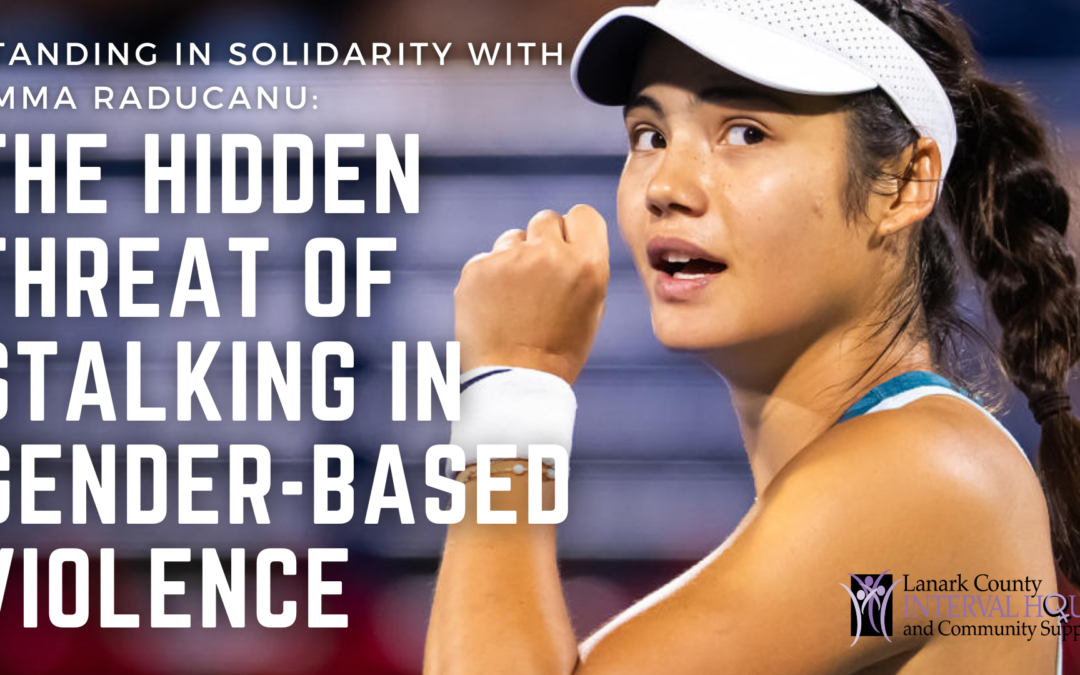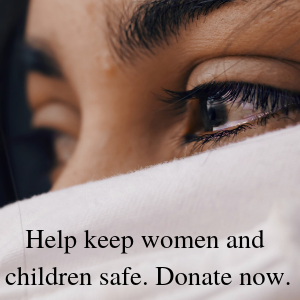Did you watch the Dubai Tennis Championship match that paused because of gender-based violence?
Tennis player Emma Raducanu was forced to stop her match after noticing a man in the crowd whose behaviour had made her feel unsafe. What might have seemed like an overreaction to some was, in fact, a vital step toward her safety. This incident highlights a serious, often overlooked aspect of gender-based violence—stalking, or criminal harassment as it’s called in Canada.
Emma Raducanu is far from the only high-profile woman affected by stalking. In fact, many women athletes, including Katie Boulter, Danielle Collins, and Sloane Stephens, have all shared personal stories of being stalked or harassed, both in person and online. But stalking isn’t just an issue for celebrities or athletes—it’s happening in communities across Canada every day.
What Is Stalking?
In Canada, stalking is legally defined as criminal harassment, and it includes repeated and unwanted behaviour that causes the victim to feel fear for their safety. This could involve following someone, showing up at their home or workplace uninvited, sending repeated and unwanted messages, or making threats.
According to The Canadian Anti-Stalking Association, stalking affects 1 in 6 women in Canada. It is not only an emotional burden but can escalate into more dangerous situations, potentially leading to physical violence. Research indicates that approximately 76% of stalkers are men, and 29% of stalking victims reported being stalked for more than a year before the harassment stopped. For many victims, the experience can be isolating and frightening, especially when there is limited support or understanding of what they are going through.
Stalking Is a Gendered Issue
While stalking can happen to anyone, it is a significant form of gender-based violence that disproportionately impacts women. This is particularly concerning in light of our See It, Name It, Change It campaign. This campaign calls for the identification of all forms of gender-based violence, including stalking, and advocates for real, lasting changes in how society responds to and addresses these issues.
The See It, Name It, Change It campaign empowers individuals and communities to see gender-based violence in all its forms, name it for what it is, and take action to create a safer environment for everyone. Stalking is just one piece of a larger issue of violence against women and girls, and by raising awareness, we can begin to shift societal attitudes and practices that normalize harmful behaviours.
Stalking and criminal harassment are often brushed aside or misunderstood. Society sometimes downplays these behaviours, dismissing them as “just part of being a public figure” or “attention-seeking behaviour.” But the truth is that stalking is a serious issue that impacts the mental, emotional, and physical health of the victims. Women who are stalked face higher rates of anxiety, depression, and post-traumatic stress disorder (PTSD). In extreme cases, stalking can lead to assault, homicide, or other forms of violent retaliation.
What Can We Do About It?
We must take action, starting with believing and supporting those who speak up about their experiences. When someone comes forward, whether it’s a celebrity or someone we know personally, it is essential to listen and validate their concerns. Too often, survivors of stalking or harassment face dismissal or disbelief, which can silence them and prevent them from seeking help.
Another important step is learning the signs of stalking and understanding how it impacts survivors. Many people are not aware of what constitutes stalking, especially when it happens online or through seemingly harmless gestures like frequent “checking in” or unwanted compliments. Education is key to ensuring that stalking is recognized early, before it can escalate into more dangerous behaviour.
Finally, advocating for stronger policies and protections against stalking and criminal harassment is crucial. Legal frameworks must evolve to better protect victims, and more resources need to be allocated to support survivors and help them navigate the legal system. Advocacy can also play a role in holding perpetrators accountable and challenging the systems that fail to adequately address stalking.
In Canada, the Criminal Code does make provisions for stalking under the offence of criminal harassment, but the reality is that many cases are never reported, and many victims remain silent due to fear, shame, or a lack of resources. A stronger public understanding of stalking as a form of gender-based violence, coupled with increased accountability, is essential.
From Sport to Everyday Life: A Collective Responsibility
The case of Emma Raducanu brings attention to the prevalence of stalking in the lives of women, especially those in the public eye. But as the experiences of other female athletes have shown, this issue extends far beyond the world of tennis. Stalking can occur anywhere—in workplaces, schools, or in public spaces. It can happen to anyone, and the impacts can be long-lasting.
Stalking is often a precursor to other forms of violence, and yet it remains a problem that is underreported and misunderstood. In 2023, a UN handbook focused on violence against women and girls in sports found that the sports ecosystem often presents significant barriers to addressing gender-based violence. These barriers include a lack of accountability, transparency, and a defensive mindset. Many sports organizations have prioritized maintaining the sport’s image and financial success over protecting the safety and well-being of individuals. Unfortunately, this is far from an isolated issue.
As women’s sports continue to grow in popularity and significance, they can play a crucial role in advancing gender equality, empowering women athletes, and challenging outdated societal views. However, it is important to recognize that women’s sports should not be expected to solve the problems that have long been ignored or brushed aside in men’s games. This is especially concerning in today’s climate, where we are witnessing a troubling backlash against feminism, making it more critical than ever to address these ongoing issues in all corners of society.
As individuals and communities, we have a collective responsibility to challenge the culture that allows stalking and gender-based violence to persist. This means confronting the normalization of harmful behaviours, whether in the media, sports, or everyday life. We need to demand that everyone, from athletes to everyday citizens, can live and work in spaces that are free from fear and harassment.
Join the Fight: Support the See It, Name It, Change It Campaign
At Lanark County Interval House, we stand in solidarity with Emma Raducanu and all those who have experienced stalking and harassment. We invite you to join us in supporting the See It, Name It, Change It campaign. Together, we can raise awareness, advocate for stronger protections, and build a safer, more inclusive society.
Take action today:
- Learn the signs of stalking and support survivors.
- Advocate for stronger policies to address stalking and harassment.
- Share stories, raise awareness, and take part in community actions.
For more information on stalking in Canada and to access resources, visit Stalking.ca, and stay informed about the See It, Name It, Change It campaign on our website here.
No one should have to choose between their career, their safety, or their peace of mind. Let’s challenge the culture that normalizes this behavior and work toward a future where all women can live, work, and play safely. Together, we can help create a future where no one, regardless of their fame or status, is forced to face stalking or violence alone.


